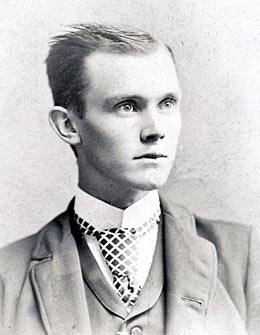John James Smith was a medical doctor from West Virginia who came to the Northwest in the late 1800s to work for a mining company. He settled in Enumclaw in 1901, where he carved out a successful career as a doctor, banker, and civic leader. William Kombol, manager of the Palmer Coking Coal Company in Black Diamond and a frequent contributor to HistoryLink, has researched Smith's life and written this People's History that tells of one man's contributions to his early King County community.
The Miners' Medical Man
John James Smith was born in Salt Sulphur Springs, West Virginia in 1869. He was educated at Long Island College and trained to be a doctor at the associated hospital in Brooklyn, New York. He came to the Northwest and was first employed as a company doctor by the Oregon Improvement Company to serve miners working at their Franklin coal mines, located east of Black Diamond. Franklin was a dangerous place during Smith’s first days, when strikebreakers were being employed in the mines. He reported being shot at on several occasions walking across the trestle near the Green River Gorge.
During the labor troubles and strike in Franklin in May 1891 Smith was called upon to operate on a man whose leg had been badly mangled. His surgical instruments hadn’t yet arrived, so he went to William Weimar’s meat market and borrowed his butcher knives. The leg was amputated and healed nicely, and the man successfully used a wooden leg for the rest of his life. Smith claimed to his dying day that it was the best operation he had ever performed.
Politics, Marriage, and Career
Smith became the youngest member of the Washington State Legislature when elected to the House of Representatives in 1899, and he later moved up to the Senate where he was re-elected in 1902. In 1901 Smith moved to Enumclaw and established a successful private medical practice, and in 1903 he married Selma Hanson (b. 1881), a daughter of Carl M. (1839-1906) and Anna (Gustafson) Hanson (1841-1923), Swedish immigrants and sawmill pioneers who had recently purchased the White River Lumber Company in Enumclaw.
In 1904, Smith was a few votes shy of winning the Republican nomination for governor, but withdrew due to political complications. Undeterred, that same year he teamed up with A. W. Stone, Archie Stone, Frank Hanson (1869-1935), Axel G. Hanson (1864-1943), and Sam Lafromboise to establish the State Bank of Enumclaw, which later became First National Bank of Enumclaw. His only son, Rufus Smith, later served as president of this long-lived local banking institution.
According to Ralph Munro (a member of the Hanson family), Smith created the "Peaches and Cream" campaign to build the Chinook Pass highway connecting Yakima (Peaches) and Enumclaw (Cream). The campaign featured a buxom lass named Peaches and a strapping lad named Cream who could be married if only the highway between the fruit capital of Yakima and the dairy center of Enumclaw was built.
Gone Too Soon
Dr. Smith was a revered man in town. The Women’s Progressive Club noted:
"how often is heard the comment that Enumclaw is the cleanest and most beautiful town in the State. Dr. Smith did much in his lifetime to make it so. If a shack or building was offensive to view he induced the owner to tear it down, paint or remove it. Failing in all such attempts, he bought the premises and no longer was the objectionable object permitted to remain" ("The Pioneer History of Enumclaw").
Smith also was active in school affairs and was successful in greatly expanding the boundaries of the school district.
In 1910, the community of Enumclaw was shocked when, at the age of 41, Smith’s life was taken by a disease labeled as typhoid fever. The death of one of the most prominent citizens of Enumclaw was lamented far and wide. In 1912, a magnificent new school was named in his honor. When that older school, located at the current site of the Enumclaw Municipal Building, was torn down and a new elementary school built in 1957 on the corner of Griffin Avenue and Fell Street, it too carried the name of this Enumclaw pioneer.

